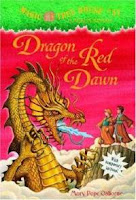One night last week, my second grade son Nathan stayed up late reading Mary Pope Osborne’s Dragon of the Red Dawn from the Merlin Mission installments of The Magic Tree House series. I was very pleased to see this because Nathan has always been my eager reader but second grade brought about a bit of a change. He became a “take it or leave it” reader—devouring books that captured his fancy and being perfunctory at all other times. It was good to see him feeling hungry for his old friends Jack and Annie.
The next morning, he came into my room with the book in hand and said, “Mom, mom, you’ve got to hear this!” The passage he read aloud went like this:
Below the tree house was a beautiful garden filled with cherry trees and long-leafed willows. A waterfall tumbled into a sparkling green pool.
He went on to say, “Can’t you picture that mom? Isn’t that beautiful? You know, I like the Merlin Missions so much better than the “original” Magic Tree House. I have to read these books slower and I like them so much better because they don’t take me just a day to finish like the other ones.”
Really?
When I talk to teachers about book choice, I often encourage them to allow children to choose “easy” reads. I implore teachers to bless magazines and picture books and comics as valid reading but teachers are skeptical. I am often questioned about this idea of “challenging” young readers. If students are capable of reading a chapter book, why shouldn’t they? If they are always reading things that are too easy, how will they grow as readers?
I think these concerns have real merit, but my response always begins like this: If our students do not embrace reading, hard or easy, it won’t matter because they won’t be doing much of either. And the second thing I always say is that nobody stays in the same place as a reader forever. Nathan is living proof. Once upon a time, Dinosaurs Before Dark and Afternoon on the Amazon satisfied him as a reader. Now, he craves longer books. He craves books with richer description and that is why the Merlin Missions, with their familiar characters, but slightly more complex language, have rekindled a fire.
When I was in high school, I loved VC Andrews and Danielle Steel. Once I got married and settled into my grown up life, romance novels no longer had the appeal they once did. I moved on to Belva Plain and then read everything by Jodi Piccoult. I eventually tired of them and began a steady and exclusive diet of non-fiction. Now I love Malcom Gladwell and Chip and Dan Heath, and of course, all books about literacy and learning. If anybody would have told me that VC Andrews was not challenging enough and suggested that I try out something more my “speed,” I wouldn’t have. I wanted to read what I wanted to read. And when I was done, I moved on to the next thing that I wanted to read. Like I said before, nobody stays in the same place as a reader forever. If you doubt me, think about your own reading life. Do you read the same stuff you read in high school?


I so whole-heartedly agree, Kim! It's sometimes as if we're saying to kids – "You're old enough to catch the bus to school, handle your own pocket money, do chores but no, you will read what I want you to read." Crazy, because it turns kids off reading!
Most of my reading nowadays is non-fiction too. If you'd told me that when I was in High School, I'd have found it hard to believe.
I'm with you on that one, Book Chook. Exclusively non-fiction? I'd have said "not a chance" too. Now imagine what might have happened had someone forced my hand to read stuff more my speed? VC Andrews and Danielle Steel and Belva Plain and Jodi Piccoult were stepping stones to the reader I am today. Had I been forced, maybe I wouldn't read much at all. We've got to honor those stepping stones!
But if a young child can and wants to read even one book that is hard to read for his peers, then there is nothing wrong with that. If a book is too easy, kids might get bored with reading and not want to read at all, perhaps that's why your son read the books that were easy for him hastily. My Spanish teacher said that when she was in grade school her class read things like Ali Baba and the 40 Thieves, which she said fascinated her. She said that later, Dick and Jane books came out and they were so simple (both in the language that was used and the topics and amount of words per page)and boring. Of course, anyone will be frustrated with books above his or her level, and not want to read them if they are too hard or if they aren't helped by someone who can help them interpret the passage, but I think that everyone should be challenged, and challenge themselves at all times so that we don't become to laxed, because then we become lazy and things start to fall apart. I think it's important that kids are pushed early on so that they can learn the meaning of hard work and to value it, you wouldn't give a young child a text that it way out of his reach, but besides books that kids like to read on their own, schools challenge kids to read books that will challenge them.
Sorry I haven't expresses myself very well here, I feel like my writing is like that of someone who just started school now, but I can't edit it, I have to go.
I think the point here comes back to choice. If a child is choosing easy books, we should not deny them that. When a child is choosing difficult books, we need to handle the way in which we guide them delicately. In my early years of teaching, I had a fifth grade boy insisting on reading Little Women. I was all about "choice" and let him read this book knowing full well that he was a struggling reader. He read this book all throughout October and November and December. I was afraid to squash his enthusiasm because he was adament he wanted to read this book. In hindsight, this was a case where I really needed to guide this reader away from a book that was too hard. He wasn't reading the volume he needed to read in order to become a better, more proficient reader. I suspsect that he probably insisted reading this book not because he was in love with the title or the topic, but because it was fat and he liked how he perceived his peers would perceive him.